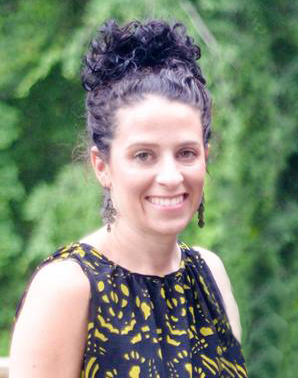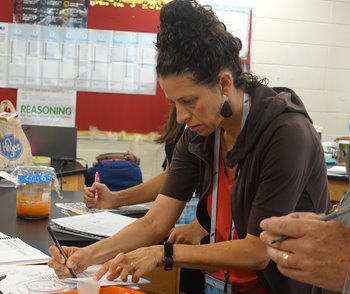From Organic Farmer to Environmental Science Teacher
Angela Chambers |
September 19, 2019

 After working on organic farms in Italy and Costa Rica, Lesley Yarnell brings these real-world lessons to her students. The AP® Environmental Science teacher at Greenbrier High School in Evans, Georgia, is NMSI’s September Teacher of the Month.
After working on organic farms in Italy and Costa Rica, Lesley Yarnell brings these real-world lessons to her students. The AP® Environmental Science teacher at Greenbrier High School in Evans, Georgia, is NMSI’s September Teacher of the Month.
“Ms. Yarnell teaches her students how to be good stewards of our natural resources,” says Lisa Guilbeau, Greenbrier assistant principal. “She is very concerned with the earth and conserving resources. She grows lettuce in her classroom and encourages our entire school to not use plastic. She has visited community stakeholders to ensure we have recycle trash cans on our campus. She takes her students on outside field trips to learn about the earth, including the Savannah River site to explore energy consumption.”
Yarnell, who has been a teacher for 13 years and grew up in Bedford, Pennsylvania, shares how she instills a passion for conservation and the sciences. She also knows firsthand what it’s like to move around with the military when her husband served in the U.S. Army. Greenbrier is close to Fort Gordon.
Tell us about your experiences working on organic farms in Italy and Costa Rica.
After my husband returned from his deployment in Afghanistan, we left our jobs and took a worldwide opportunity to work on organic farms. We learned the trade for a year. We learned beekeeping, how to extract maple syrup – you name it. The farm in Costa Rica taught us how to grow plants by utilizing water efficiently, how to do sustainable irrigation and put it into practice.
How do you apply these lessons to your environmental science classroom?
I have a tower garden in the classroom that demonstrates how to grow vertically and in less space that students compare to a garden outside. Students have a garden club and show up after school to plant things. I also have some working with a locally grown farm co-op. They light up when what we talk about in class can be put into practice. I think they’ll take the sustainable practices they learned with them when they leave high school.
My students have such different experiences from different parts of the world, like how other places deal with waste management. I’ve learned a lot from my students, and that makes my job exciting.
Can you share specific examples of lessons learned from students?
I’ve had a student from India explain how a lot of homes in his town didn’t have running water, so his family would have to fetch water every day. Him being able to tell the story to students who think running water and electricity is a given is really powerful. When we’re getting into the water unit, it gives a global perspective. There are different ways of water management, but we still have a lot of the same goals.
When we were doing metrics in class, a student whose family lived with the military in Germany explained the importance of using this measurement that’s used worldwide.
How do you support military-connected students at Greenbrier?
When I learn they’re military and just moved here, a lot of the time, they miss home and friends. I tell them about all the great things to do in Augusta [Georgia] and tell them I’m from Pennsylvania and lived in California, but we really love it here. You have to understand things, like they might not have internet yet and are living out of boxes for a few weeks. I try to make sure lessons are applicable to their life and also consider that they might not have the resources at home at the moment to complete things out of school. Making sure they feel welcome is important, too.
How do you help these students feel welcome?
We have a new families banquet, so the kids can get together and sit down and eat and talk to get to know each other. We have specific wrap-around services for military students coming in and various resources. I have so much respect for military families and their children. There are always people available to help you. Reach out to teachers and administrators at schools.
Why did you want to become a teacher?
 I grew up in rural Pennsylvania, and nature was a big part of life. I knew I wanted to go into biology and a science field. When I was in college, I would go across the hall and tell my roommate about what I was studying, and she jokingly said, “You should consider teaching,” and I did. I would much rather be teaching and working with students than working in a lab. I prefer sharing knowledge with young people.
I grew up in rural Pennsylvania, and nature was a big part of life. I knew I wanted to go into biology and a science field. When I was in college, I would go across the hall and tell my roommate about what I was studying, and she jokingly said, “You should consider teaching,” and I did. I would much rather be teaching and working with students than working in a lab. I prefer sharing knowledge with young people.
How has NMSI helped to support your work in the classroom?
I just got back from [NMSI] summer training in Atlanta, and I learned about new curriculum the College Board rolled out for AP Environmental Science. It’s really helpful to collaborate with other educators. There were so many ideas brought to the table. It was fantastic.
Know a NMSI-connected teacher who deserves recognition? Email marketing@nms.org to tell us how they are making a difference in math, science and English education for their students.